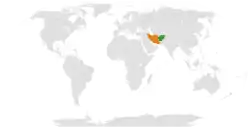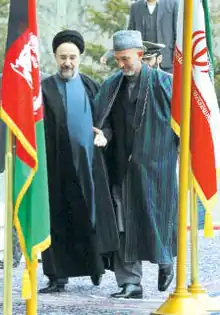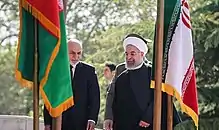Afghanistan–Iran relations
Afghanistan–Iran relations were established in 1935 during King Zahir Shah's reign and the Shah of Iran Reza Shah Pahlavi, though ties between the two countries have existed for millennia. As a result, many Afghans speak Persian, while Dari (an eastern dialect of Persian) is one of the official languages of Afghanistan and many in Afghanistan also celebrate Nowruz, the Persian New Year. They have been negatively affected by the 1979 Iranian Revolution and issues related to the 1978–present Afghan conflicts (i.e. Mujahideen, Afghan refugees, and Taliban), as well as Iran's water dispute and the growing influence of the United States in Afghanistan.[1] In July 2019, the Iranian government passed a law that provides Afghan nationals with a new chance to get Iran's residency. Afghans with specific scientific and professional achievements and those who have Iranian spouses and children are among those who are qualified to benefit from the law.[2]
 | |
Afghanistan |
Iran |
|---|---|
Historical context
Afghanistan shares a relatively long history with Iran (called Persia in the West before 1935) and it was part of many Persian Empires such as Achaemenid and Sasanian dynasties. In fact the regions which encompass the modern state of Afghanistan were considered an integral part of Iran (Persia) by the 11th century poet Firdawsi in his Shahnameh,[3] Zabulistan was even considered the homeland of the Iranian hero Rostam.[4] When the Safavid dynasty was founded in Persia, part of what is now Afghanistan was ruled by the Khanate of Bukhara and Babur from Kabulistan. The first Iranian Safavid Shah Shah Ismail I quickly expanded his empire in all directions, in which he also conquered large parts of nowadays Afghanistan. For centuries they ruled the region and the Safavids didn't have any problems at first ruling the easternmost territories of their empire, but their policy towards non-Shia subjects became worse and worse over time. Wars began between the Shia Safavids and the larger Sunnis, particularly in the Old Kandahar region. By the late 17th century, the Safavids were heavily declining. They had appointed their Georgian subject Gurgin Khan as governor of Kandahar in order to forcefully convert the Afghans from Sunni Islam to Shia Islam. This went with much oppression and violence.
It remained this way until the rise of Mirwais Hotak, a well-respected Sunni Ghilzai Pashtun tribal chief. Mirwais succeeded in defeating the declining Safavids in a succession of battles and declared southern Afghanistan a completely independent country. His son Mahmud conquered Persia for a short time in 1722, while it was ridden by civil strife and foreign interests from the Safavids' archrivals, the Ottomans and the Russians, and soon afterward, the Safavid dynasty ended.[5]
Despite those events, there are cultural ties between the two nations extending thousands of years. As a result, an eastern dialect of Persian, Dari is one of the official dialects of Afghanistan. Many in Afghanistan celebrate Nowruz, a pre-Islamic Iranian spring celebration celebrated in many countries and regions in the world, the main representative being Balkh a province in the north of Afghanistan.
Diplomatic relations

Afghanistan signed a treaty of friendship with Iran in 1921,[6] when the country was ruled by King Amanullah Khan and Iran was still under the Qajar dynasty. In September 1961 ties between two countries were broken off and resumed in May 1963.[7] Prior to 1979, the year in which Iran underwent the Iranian Revolution and Afghanistan was invaded by the Soviet Union, the issue of water rights of the Helmand River were an issue of great importance between the two nations. Disputes over the Helmand water occurred in the 1870s, flaring again after the river changed course in 1896. In 1939, the kings of the two countries signed an accord to share water rights, which was signed but never ratified. That was repeated in 1973 with a treaty between the prime ministers of both nations and again not ratified.[8][9][10] According to a Reuters report, In 2018 Afghan forces accused Iran of presenting the Taliban with arms and money, but Iran denies the accusation.[11]
According to the Daily Pioneer, because of the ongoing agreement between Iran and Afghanistan, their relationship has yet to be manipulated by any third party and will remain so in the future.[12] An increase in Taliban activity in the border between Iran and Afghanistan suggests a possible cooperation between the Iranian forces and the Talibans, according to DW.[13]
Post-1979

In December 1979, the Soviet Union sent around 100,000 troops to the Democratic Republic of Afghanistan to assist the PDPA government against a nationwide mujahideen insurgency. The mujahideen were made up of various groups that were trained by Pakistan, Saudi Arabia, and the United States. A number of revolutionary Shi'a groups took control of parts of Hazarajat in 1979 in opposition to the mujahideen groups, and had ties to the Iranian government. After the death of Khomeini in 1989, the Iranian government encouraged many of the Shi'a groups to combine and establish the Hezb-e Wahdat, hoping that they would be included in international negotiations. Between the Soviet Union's withdrawal in February 1989 and the fall from power of president Najibullah in April 1992, Iran supported the PDPA government. In the words of historian Barnett Rubin, "Iran saw the Soviet-backed Kabul government as the main force blocking the takeover of Afghanistan by Sunni Wahhabi parties backed by these three countries [Pakistan, Saudi Arabia, and the United States]. Although it continued to support Shia parties politically, it did not support their making war on the Najibullah government."[14] In the meantime, over a million Afghan refugees were allowed to enter Iran.[15][16]
Following the emergence of the Taliban government and their harsh treatment of Afghanistan's minorities, Iran stepped up assistance to the Northern Alliance. Relations with the Taliban deteriorated further in 1998 after Taliban forces seized the Iranian consulate in the northern Afghan city of Mazar-i-Sharif and executed Iranian diplomats.
Since late 2001, the new Afghan government under Hamid Karzai has engaged in cordial relations with both Iran and the United States, even as relations between the United States and Iran have grown strained due to American objections to Iran's nuclear program. Iran was an important factor in the overthrow of the Taliban and has since helped revive Afghanistan's economy and infrastructure.[17] It re-opened the Iranian Embassy in Kabul and its associated consulates in other Afghan cities. In the meantime, Iran joined the reconstruction of Afghanistan. Most of its contributions are aimed at developing the Afghan Shi'a communities, especially the ethnic Hazaras and Qizilbash.[18] Iran also has influence on political parties represented by ethnic Tajiks, which includes Abdullah Abdullah's Coalition for Change and Hope and others. On the contrary, many Afghan politicians and experts claim that both Iran and Pakistan are working to weaken Afghanistan.[19]
Besides Afghan lawmakers, leaders in the United States and many NATO officials also believe that Iran is meddling in Afghanistan by playing a double game.[20] Iran usually denies these accusations.[21][22] For a number of years many senior ISAF officials and others have been accusing Iran of supplying and training the Taliban insurgents.[23][24][25][26][27][28][29][30]
"We did interdict a shipment, without question the Revolutionary Guard's core Quds Force, through a known Taliban facilitator. Three of the individuals were killed... Iranians certainly view as making life more difficult for us if Afghanistan is unstable. We don't have that kind of relationship with the Iranians. That's why I am particularly troubled by the interception of weapons coming from Iran. But we know that it's more than weapons; it's money; it's also according to some reports, training at Iranian camps as well."[31]

The government of Iran is strongly against the American military presence in Afghanistan.[32] Iranian officials often criticize specifically the American military in Afghanistan:
"The Americans will have the same success in Afghanistan as in Vietnam. Years ago the Soviet Union made exactly the same mistake. Many people were killed and it finally pulled out. History repeats itself. We know Afghanistan. We know that Afghanistan will never submit to foreign armies."[33]
— Ali Larijani, July 2010
[34] Ties between Afghanistan and Iran became further strained in recent years due to Iran's toughened immigration policy, hastening the repatriation of many Afghan asylum seekers.[35] A number of Afghans were executed by hanging in public for crimes punishable with death in Iran (murder, rape, smuggling large amount of drugs, and armed robbery) which sparked angry demonstrations in Afghanistan ( even though Afghanistan has the death penalty ).[36] Between 2010 and 2011, Afghan and Iranian security forces were involved in border skirmish in Nimroz Province of Afghanistan.[37] In July 2011, Iran decided to cut off electricity exports to Afghanistan's Nimroz Province.[38] In March 2012, Najibullah Kabuli, leader of the National Participation Front (NPF) of Afghanistan, accused three senior leaders of Iran's Revolutionary Guards of plotting to assassinate him.[39] Some members of the Afghan Parliament accuses Iran of setting up Taliban bases in several Iranian cities, and that "Iran is directly involved in fanning ethnic, linguistic and sectarian tensions in Afghanistan."[40]
"Currently, the Revolutionary Guards recruit young people for terrorist activities in Afghanistan and try to revive the Hezb-i-Islami Afghanistan led by Gulbadin Hekmatyar and Taliban groups"[41]
— Syed Kamal, a self-confessed agent for Iran's Revolutionary Guards and member of Sipah-i-Mohmmad
According to Saudi Arabia, Afghan Senate members certified the existence of documents which affirm that the Taliban collected endorsements from both Iran and Russia. Thus members of the Taliban are located in the cities of Mashhad, Yazd and Kerman in Iran.[42] Moreover, the Governor of the state of Farah in Afghanistan, Asif Ning, also confirmed this in an interview with the Dari-speaking Freedom Radio stating: "They are living in the cities of Yazd, Kerman and Mashhad. They eventually return to Afghanistan to vandalize. At the time being, a number of senior members of the Taliban leaders are living in Iran", adding that "[t]he bodies of Taliban fighters killed in recent clashes were delivered to their families in Iran".[43]
Afghanistan has an embassy in Tehran and a consulate in Mashad. In order to prohibit Afghans coming into the country that will bring issues related to the Afghan Civil War with them, as of 2007, Iran charges Afghans over US$100 for a one-month regular visa and a business visa costs them over US$3,000. Before 2007, the visa was issued with only $35 fee.
Fars News Agency reported Ali Shamkhani, an official of Iran's Supreme National Security Council has declared when he was visiting Afghanistan capital, Kabul on 26 December 2018 that his government has had talks with Afghan Taliban.[44]
In 2020, the Taliban publicly condemned the U.S. killing of the Iranian Quds Force commander Qassem Soleimani, expressing "deep regret over his martyrdom" and describing Soleimani as a "great warrior".[45]
Bilateral trade

Trade between the two nations has increased dramatically since the overthrow of the Taliban government in late 2001. Iran and Afghanistan plan on building a new rail line connecting Mashhad to Herat. In 2009, Iran was one of the largest investor in Afghanistan, which is mainly in the construction of roads and bridges as well as agriculture and health care.
According to the chairman of Afghanistan Chamber of Commerce and Industries, Iran's exports to Afghanistan in 2008 stood at $800 million. IRNA quoted Mohammad Qorban Haqju as saying that Iran imported $4 million worth of products like fresh and dried fruits, minerals, precious stones, and spices from the neighboring country. He said that Iran exported oil products, cement, construction material, carpets, home appliances, and detergents. Iran imported nuts, carpets, agricultural products as well as handicrafts from Afghanistan. Afghanistan imports 90 percent of its needs, except agricultural products.
Afghanistan is a major opium producer. Afghanistan produces 90% of world's heroin. Some of these drugs are smuggled into Iran and from there to European countries.[46] Afghanistan and Iran have been persuaded to cooperate with each other in reciprocal beneficial ways due to worsening economic conditions, according to the diplomat.[47]
According to the Washington Post, towards the end of 2018, Iran's military said that it was taking over the security of the Iran and Afghanistan border.[48]
See also
| Wikimedia Commons has media related to Relations of Afghanistan and Iran. |
References
- Mujib Mashal What Iran and Pakistan Want from the Afghans: Water Time (Kabul) 2 December 2012
- Why and How to Get Iran's ResidencyIFP News 4 July 2019
- https://www.bbc.com/persian/arts/2011/05/110516_l23_persian_lan_gel_shahnameh_city_rm
- Rostam und Sohrab: Eine Heldengeschichte in zwölf Büchern - Neuausgabe, by Friedrich Rückert
- Romano, Amy (2003). A Historical Atlas of Afghanistan. The Rosen Publishing Group. p. 28. ISBN 978-0-8239-3863-6. Retrieved 17 October 2010.
- Clements, Frank (2003). Conflict in Afghanistan: A historical encyclopedia. ABC-CLIO. p. 8. ISBN 1-85109-402-4. Retrieved 22 February 2012.
- "Ties with Kabul resumed. 50 Years ago Today". The Dawn. 29 May 2013. Retrieved 29 November 2013.
- Samii, Bill (7 September 2005). "Iran/Afghanistan: Still No Resolution For Century-Old Water Dispute". Radio Free Europe/Radio Liberty (RFE/RL). Retrieved 12 January 2012.
- "Why a dam in Afghanistan might set back peace".
- "Iran speaks up for water rights". 19 June 2002. Retrieved 7 October 2019.
- "Iran in talks with Afghan Taliban: Iranian state media report".
- "Afghanistan-Iran relations".
- "Iranian support of Afghan Taliban targeted by new US sanctions".
- Rubin, Barnett R. (2013). Afghanistan from the Cold War through the War on Terror. New York, NY: Oxford University Press. p. 34. ISBN 9780199791125.
- "UNHCR country operations profile - Islamic Republic of Iran". United Nations High Commissioner for Refugees (UNHCR). 2012. Retrieved 15 December 2012.
- "AFGHANISTAN-IRAN: Mehdi". Revolutionary Association of the Women of Afghanistan. 12 February 2012. Retrieved 4 March 2012.
- Iran 'ready' to aid Afghanistan' Kaveh L Afrasiabi. 13 March 2009.
- Golnaz Esfandiari (26 January 2005). "Afghanistan/Iran: Relations Between Tehran, Kabul Growing Stronger". Pars Times. Retrieved 11 January 2012.
- "Iran, Pakistan out to weaken Afghanistan, MPs told". 20 May 2012. Retrieved 15 December 2012.
Pakistani and Iranian spies have joined hands to weaken the Karzai government by killing Afghan elders and trying to disrupt the current system, senior security officials told parliamentarians on Sunday.
- Mark Sappenfield (8 August 2007). "Is Iran meddling in Afghanistan?". The Christian Science Monitor.
- "Afghan President Karzai Declares Iran a Helper". NPR. 7 August 2007. Retrieved 20 April 2016.
- "Iranian Weapons Found in Afghanistan". Military. 5 June 2007. Retrieved 12 January 2012.
- Breffni O'Rourke (18 April 2007). "Afghanistan: U.S. Says Iranian-Made Weapons Found". Radio Free Europe/Radio Liberty (RFE/RL). Retrieved 12 January 2012.
- "Iranian weapons found in Afghanistan". CTV. Associated Press. 4 June 2007. Archived from the original on 15 January 2013. Retrieved 12 January 2012.
- Iranian weapons cache found in Afghanistan: US. 10 September 2009.
- "Afghans find tons of explosive devices transferred from Iran". CNN. 6 October 2010. Archived from the original on 5 March 2012. Retrieved 12 January 2012.
- "Isaf Seizes Iranian Weapons in Nimroz". Retrieved 20 April 2016.
- "Is Iran Supporting the Insurgency in Afghanistan?". The Jamestown Foundation. Retrieved 20 April 2016.
- Iran still supporting Afghan insurgency-U.S. Reuters 23 November 2010
- Iran accused of supporting Afghan insurgents
- Lalit K Jha (16 March 2011). "Concern in US over increasing Iranian activity in Afghanistan". Pajhwok Afghan News. Retrieved 11 January 2012.
- "Iran warns of US stay in Afghanistan". Press TV. 25 November 2011. Retrieved 11 January 2012.
- Afghanistan will be US's new Vietnam: Iran speaker Archived 24 July 2010 at the Wayback Machine
- http://www.nato.int/nato_static_fl2014/assets/pdf/pdf_2017_05/20170523_2017-05-RSM-Placemat.pdf
- Alisa Tang (15 June 2007), "Iran Forcibly Deports 100,000 Afghans", The Washington Post, retrieved 3 September 2011
- "Afghans demonstrate against Iranian 'ill-treatment' and executions of Afghan refugees", BBC News, 6 May 2010, retrieved 3 September 2010
- "Iran's forces attack Afghan post in Nimroz". Pajhwok Afghan News. 11 April 2011. Archived from the original on 13 April 2011. Retrieved 11 January 2012.
- "Iran cuts off electricity exports to Nimroz". Pajhwok Afghan News. 4 July 2011. Retrieved 11 January 2012.
- Khwaja Baser Ahmad, ed. (4 March 2012). "Iran's Revolutionary Guards plotting to kill me: Kabuli". Pajhwok Afghan News. Archived from the original on 2 December 2013. Retrieved 4 March 2012.
- Abasin Zaheer, ed. (27 March 2012). "Afghan MPs fault Ahmadinejad's remarks". Pahjwok Afghan News. Retrieved 27 March 2012.
- Khwaja Basir Ahmad, ed. (7 May 2012). "Alleged spies say Iran's Revolutionary Guards trained them". Pahjwok Afghan News. Archived from the original on 3 December 2013. Retrieved 7 May 2012.
- "Afghan Senate: Iran and Russia are supporting Taliban". Al Arabiya. 8 December 2016.
- "Afghan Senate: Iran and Russia are supporting Taliban". Al Arabiya. 8 December 2016.
- Iranian Media: Tehran Held Talks With Afghan Taliban
- "Taliban condemn killing of Iran's Qassem Soleimani". Al Arabiya. 5 January 2020.
- INTERVIEW-Iran committed to Afghan drug fight, UN says Daniel Flynn. 27 June 2009
- "Are Afghanistan-Iran Relations on the Mend?".
- "Iran's cooperation with the Taliban could affect talks on U.S. withdrawal from Afghanistan".

